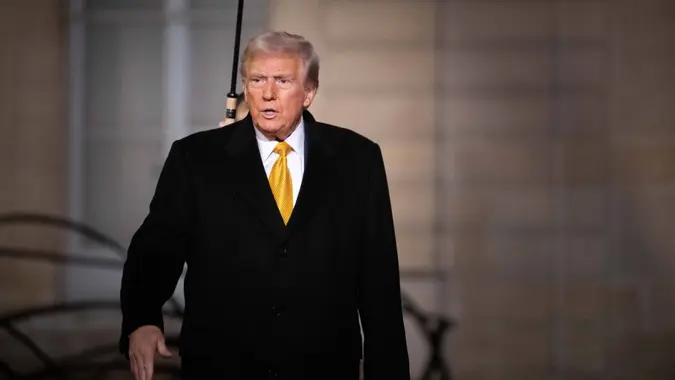4 Things Retirees Shouldn’t Do With Their Money Before Trump Takes Office

Commitment to Our Readers
GOBankingRates' editorial team is committed to bringing you unbiased reviews and information. We use data-driven methodologies to evaluate financial products and services - our reviews and ratings are not influenced by advertisers. You can read more about our editorial guidelines and our products and services review methodology.

20 Years
Helping You Live Richer

Reviewed
by Experts

Trusted by
Millions of Readers
From taxes to prescription drug costs, President-elect Donald Trump’s policies could bring a mixture of uncertainty, anxiety and hope for retirees.
“When a new President is about to take office, it’s like watching a storm loom in the distance,” said Jason Hishmeh, co-founder, partner and chief technology officer of Varyence and co-founder, investor and partner of Get Startup Funding. “We don’t know how violent the weather will be or whether it will pass in a light drizzle.”
It’s tempting for retirees to make big money moves in anticipation of the inauguration of a new president. But hasty decisions can do more harm than good. Here are some things retirees shouldn’t do with their money before Trump takes office.
Be Impulsive
One of the most common mistakes retirees make during times of uncertainty is reacting hastily to market downturns to prevent losses, said Stuart Schiffman, founder and managing partner of Compound Wealth Advisors.
“While occasional rebalancing is always a good idea, making major changes to your investment portfolio is typically not,” Schiffman said. “Portfolios should be developed with an understanding of expected potential volatility.”
In addition, Schiffman said not sticking with the portfolio allocation is a violation of the investment strategy.
“It’s highly unlikely you will achieve your long-term goals if you move your money in and out of the market based on loss aversion,” he said.
Withdraw Large Sums of Money
Christopher Stroup, founder and president of Silicon Beach Financial, said retirees should wait and see before making major money decisions.
“Retirees should be cautious about withdrawing large sums or making major financial moves before understanding any new policies,” Stroup said. “It’s often better to stick to a well-diversified, long-term strategy rather than making decisions based on speculative shifts in economic conditions.”
Withdrawing large sums of money and holding cash may not be the best bet. “While cash provides safety, it may not keep up with inflation. A balanced, diversified portfolio is crucial for maintaining long-term purchasing power,” Stroup said.
Take On Big Debt
Don’t take on big debt during times of economic certainty, Hishmeh said.
“Whether it’s financing a new car or renovating your kitchen, mounting obligations during times of economic uncertainty can put unnecessary stress on your finances,” Hishmeh said. “My parents took control of their expenses as they neared retirement. They knew that going into debt could limit their options later, especially if there unexpected expenses such as healthcare or home repairs. It’s a lesson worth learning.”
Abandon Your Estate Plan
Trump said on the campaign trail that he would extend or make permanent many provisions of his 2017 Tax Cuts and Jobs Act (TCJA) that are set to expire in December 2025.
One provision doubled the federal estate and gift tax exemption to nearly $14 million for individuals and $28 million for married couples in 2024, indexed for inflation. Unless the newly Republican-controlled congress votes to extend TCJA before Dec. 31, 2025, the federal estate and gift tax exemption amount will revert to pre-TCJA amounts.
“Don’t abandon your estate plan or stop the process of planning in the belief that estate taxes don’t matter anymore,” said Kevin Quinn, an estate planning attorney, president and founder of Legacy Counselors. “It isn’t the laws for the next four, eight or 10 years that should concern you the most. What matters is what the law is when you die.”
Quinn said political power and policies often change.
“We have a very liberal gifting and estate tax environment today, particularly for wealthy people,” Quinn said. “It is important to lock it in so that when laws change again, they are already locked in and are in good standing. You do estate planning for life.”
Editor’s note on political coverage: GOBankingRates is nonpartisan and strives to cover all aspects of the economy objectively and present balanced reports on politically focused finance stories. You can find more coverage of this topic on GOBankingRates.com.
 Written by
Written by  Edited by
Edited by 

























